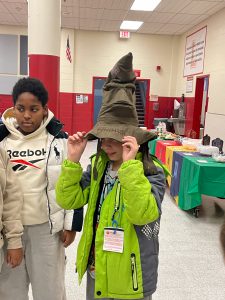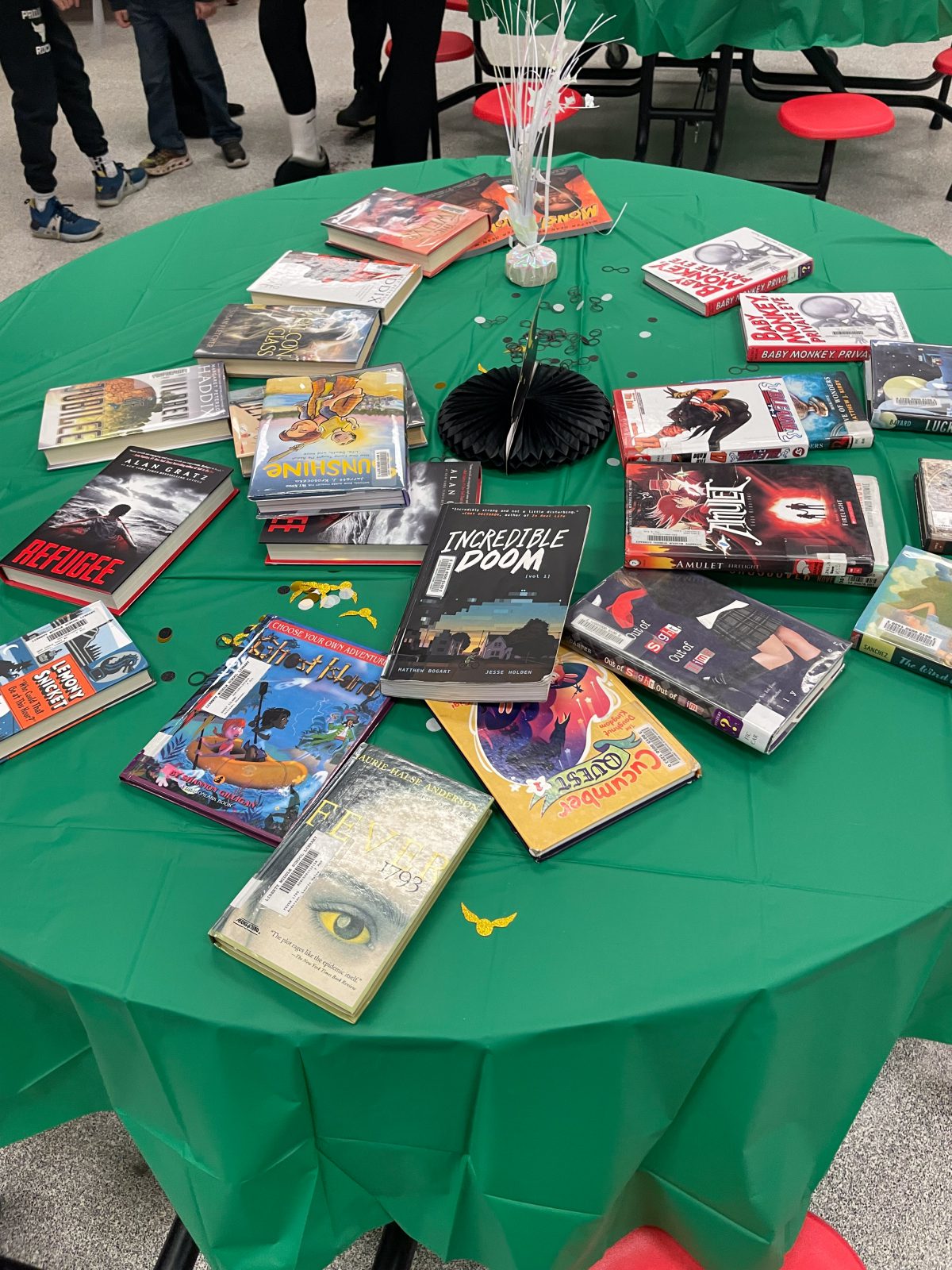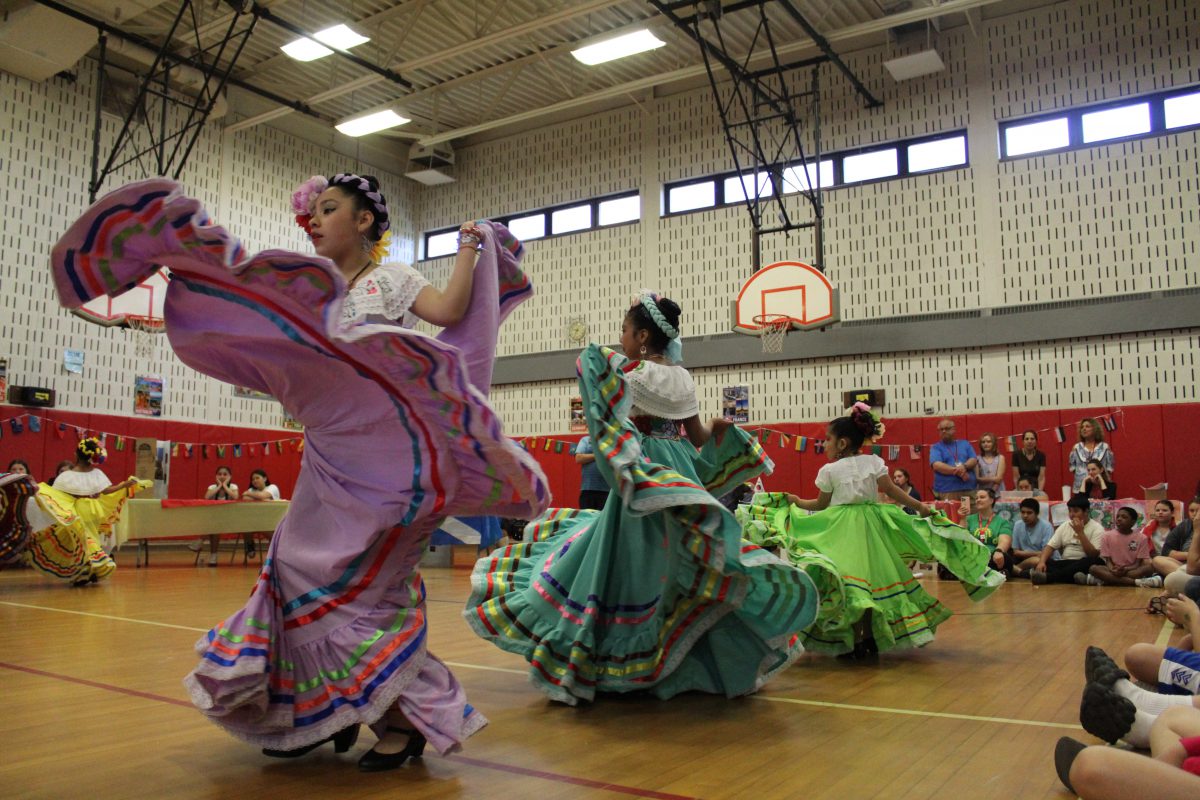Category: District News
LHS photographers earn dozens of art awards
This year, Liberty High School photography students received 31 Keys and 22 Honorable Mentions in the Mid Hudson Regional Scholastic Art competition. The Mid Hudson Regional division reaches far into Poughkeepsie and parts of Westchester as well as Sullivan and Ulster County.
Works that earn Gold Keys are in the top 5% of works judged. Silver Keys are in the top 10%. Honorable Mentions are in the top 11% or 12%. Gold key winners will be adjudicated again for possible participation in the national competition.
The following students earned honors:
- Sebastian Yupanqui with two Gold and two Silver Keys
-

Allison Vasko’s Gold Key winning photograph. Allison Vasko with one Gold and five Silver Keys, three Honorable Mentions
- Jenifer Jadan with one Gold and one Silver Key
- Savannah Pagan with one Gold Key and three Honorable Mentions
- Rachel Yaun with four Silver Keys
- Owen Moore with three Silver Keys, one Honorable Mention
- Kaitlyn Bodolosky with one Silver Key and four Honorable Mentions
- Giuliana Wagner with three Silver Keys
- Angel Figueroa with two Silver Keys, two Honorable Mentions
- Leonel Malaga Ventura with one Silver key and three Honorable Mentions
- Quinn Allen with one Silver Key and two Honorable Mentions
- Lucio Ponce Vazquez with one Silver Key and one Honorable Mention
- Carlos Cruz Garzon with one Silver Key and one Honorable Mention
- Kylie Fuller with one Silver Key
- Endya Alvarez with one Honorable Mention
- Naiara Piedy with one Honorable Mention

“Winning Scholastic Awards has given me a strong sense of accomplishment,” student Allison Vasko said. “It allows me to see that many people understand and value the work I create.”
The students’ works can be found here.
Students are now busy preparing the selected images for presentation at SUNY New Paltz for the Mid Hudson Regional Exhibition.
“I am honored to be part of this exhibition and overjoyed that my perspective resonated with others,” student Kaitlyn Bodolosky said. “I truly enjoy this event because it showcases diverse works of art, each reflecting unique viewpoints, which is what makes the show so amazing.”
The ceremony for the Key winners, open to all, will be at 7 p.m. Feb. 7 at SUNY New Paltz followed by the opening of the show with refreshments. The exhibit will be open through March 2 in the Fine Arts Building Rotunda.
Sports schedule, and results, for the week of Jan. 27-Feb. 2, 2025
Our student athletes are in action this week in alpine skiing, basketball and wrestling.
Here are the schedule and results, if available. Livestream links are included where available.
Monday, Jan. 27
4:15 p.m.: Girls Modified Basketball vs Monticello at Liberty Middle School.
4:30 p.m.: Boys JV Basketball vs. James I. O’Neill at Liberty High School
5:45 p.m.: Boys Modified Basketball vs. Monticello at Liberty Middle School
6 p.m.: Boys Varsity Basketball vs. James I. O’Neill at Liberty High School
Tuesday, Jan. 28
10 a.m.: Boys and Girls Varsity Alpine Skiing: Giant Slalom vs. Multiple Schools at Belleayre Mountain Ski Area
4:15 p.m.: Boys Modified Wrestling vs. Multiple Schools at C. J. Hooker Middle School.
5 p.m.: Girls Varsity Basketball Varsity vs. James I. O’Neill at James I. O’Neill High School
5 p.m.: Boys JV Basketball vs. Tri-Valley at Tri-Valley Central School.
6 p.m.: Girls Varsity Wrestling Multi-Matches vs. Multiple Schools at Liberty High School.
6:30 p.m.: Boys Varsity Basketball vs. Tri-Valley at Tri-Valley Central School
Wednesday, Jan. 29
No events scheduled.
Thursday, Jan. 30
4:15 p.m.: Girls Modified Basketball vs. Tri-Valley at Tri-Valley Central School.
4:15 p.m.: Boys Modified Wrestling vs. Sullivan West Central at Liberty Middle School
4:30 p.m.: Girls Varsity Alpine Skiing: Slalom vs. Multiple Schools at Mt. Peter Ski Resort.
4:30 p.m.: Boys JV Basketball vs. Port Jervis at Liberty High School.
5:45 p.m.: Boys Modified Basketball vs. Tri-Valley at Tri-Valley Central School.
6 p.m.: Boys Varsity Basketball vs. Port Jervis at Liberty High School
Friday, Jan. 31
All events canceled or postponed.
Saturday, Feb. 1
Noon: Girls Varsity Basketball vs. Tri-Valley in Audra Sipple Spath Scholarship Tournament at Livingston Manor High School
Sunday, Feb. 2
No events scheduled.
The schedule is subject to change. Check the Liberty schedule on the Section IX website for the latest.
Sixth-graders face off in reading competition
Sixth-graders at Liberty Middle School are in a heated competition.
It’s not on the field or court, but on the bookshelf, through the READBowl, a free global reading competition where PreK-12th grade aged teams around the globe compete to read for the most minutes.
The READBowl kicked off Jan. 13 and will end on Super Bowl Sunday, Feb. 9, with the crowning of the World Reading Champions.
 LMS got involved in the program after the sixth grade ELA teacher Melissa Murphy watched a video featuring Malcolm Mitchell, a professional football player who struggled to read well but took the initiative to improve his skills and has since become an author. He is also chief executive officer of the Share the Magic Foundation, which hosts the READBowl.
LMS got involved in the program after the sixth grade ELA teacher Melissa Murphy watched a video featuring Malcolm Mitchell, a professional football player who struggled to read well but took the initiative to improve his skills and has since become an author. He is also chief executive officer of the Share the Magic Foundation, which hosts the READBowl.
Mrs. Murphy shared the READBowl idea with the other sixth-grade ELA teachers and they decided to join.
To start the process, a book tasting event was held Jan.3. There, students were told more about the READBowl, set reading goals, were introduced to a variety of reading genres and selected books they’ll read throughout the READBowl. The competition kicked off at LMS with an evening of fun and games on Jan.13.
“The goal is to encourage a love of reading, teamwork, and healthy competition,” Mrs. Murphy said.
 To add to the fun, the classes are also competing against each other in a Harry Potter-inspired competition. The ELA teachers leading the respective Houses are:
To add to the fun, the classes are also competing against each other in a Harry Potter-inspired competition. The ELA teachers leading the respective Houses are:
- Ravenclaw: Mrs. Murphy and Ms. Feliciano
- Hufflepuff: Ms. Cummins
- Gryffindor: Mr. Golden and Ms. Davis
- Slytherin: Mrs. Abplanalp and Ms. Davis
Students track their reading minutes weekly. Teachers will enter the minutes for their students on the READBowl website. All reading counts—books, articles, recipes, instructions, and more. Each week is considered a “quarter,” and teachers will share the leaderboard each week.
LCSD awaits state OK of capital project plans
The capital project, approved by Liberty Central School District voters in January 2024, is moving forward, as the district awaits state Education Department approval of its plans.
In July, the district replaced architecture and engineering firm CSArch with LAN Associates.
Following testing and redesign of some aspects of the project, the plans were finalized in November and submitted to SED on Dec. 13. The district expects an update on approval from SED in February and anticipates final SED approval in April.
Once the SED approval is received, the projects will go out to bid, with bids reviewed and awarded by the Board of Education, likely in the spring.
Construction on the maintenance building was initially expected to begin in fall of 2024, with additional phases of the plan expected to begin in the late spring 2025. Because of required testing and changes in the design of the maintenance building, construction was delayed. Construction of the first phase of the capital project, which now includes construction of the maintenance building; athletic facility improvements, including the installation of a new synthetic turf field, track and field improvements, installation of a grandstand and press box, and installation of new athletic field lighting; upgrades to the HVAC controls at the middle and high school; upgrades to the carbon monoxide alarm system and replacement of exterior stairs at the high school; and replacements of some interior doors at the middle school, is now expected to begin in early summer.
Sports schedule, and results, for the week of Jan. 20-26, 2025
Our student athletes are in action this week in alpine skiing, basketball, indoor track and field and wrestling.
Here are the schedule and results, if available. Livestream links are included where available.
Monday, Jan. 20
No events scheduled.
Tuesday, Jan. 21
4:15 p.m.: Boys Modified Wrestling vs. Multiple Schools at Valley Central Middle School.
4:30 p.m.: Boys JV Basketball vs. Livingston Manor/Roscoe at Liberty High School.
6 p.m.: Boys Varsity Basketball vs. Livingston Manor/Roscoe at Liberty High School.
Wednesday, Jan. 22
3:30 p.m.: Boys and Girls Varsity Indoor Track and Field Exhibition vs. multiple schools at SUNY Sullivan.
4:15 p.m.: Boys Modified Basketball vs. Sullivan West Central at Sullivan West – Jeffersonville
5 p.m.: Boys JV Basketball vs. Highland at Liberty High School
6:30 p.m.: Boys Varsity Basketball vs. Highland at Liberty High School
Thursday, Jan. 23
All events postponed or canceled.
Friday, Jan. 24
4:30 p.m.: Girls Varsity Basketball vs. S.S. Seward Institute at Liberty High School.
Saturday, Jan. 25
9:15 a.m.: Boys Varsity Wrestling Tournament vs. Multiple Schools at Beacon High School.
Sunday, Jan. 26
No events scheduled.
The schedule is subject to change. Check the Liberty schedule on the Section IX website for the latest.
A message from the superintendent on supporting our entire student community
Dear Liberty families,
I am proud of our diverse community here at Liberty Central School District. Every one of you brings a unique perspective to our district that enriches us all.
I understand that some in our community may be concerned about changes that may occur in the coming weeks and months with a new administration.
We just want you all to know that we are committed to providing all of our students a quality education. As part of the commitment, we embrace the Parent Bill of Rights for New York State’s English Language Learners.
The document guarantees access to free public education in the school district where a student lives, regardless of the immigration status of the parent/guardian or student and the language that the family speaks. It also allows for families to enroll students without submitting paperwork that may reveal immigration status. The document also makes provisions for providing interpreters, a bilingual education and more. For more information, you can call the ELL Parent Hotline at 1-800-469-8224, email nysparenthotline@nyu.edu or mail New York State Education Department, Office of Bilingual Education & World Languages, 55 Hanson Place, Room 594, Brooklyn, NY 11217.
We also understand our rights and responsibilities in protecting and helping all of our students.
New York Gov. Kathy Hochul, the state Office of Attorney General and the state Education Department also recently issued guidance and reminders regarding the educational rights of immigrant families and the responsibilities of school districts in regard to bullying and harassment, law enforcement actions, detainment and deportation of family members. The document also listed numerous resources available to families. The full document is available on the SED website here.
It is important for us to educate our students and their families, beyond the classroom, so they can learn and grow here in Liberty.
To that end, I want to make you aware of an upcoming event to which Liberty families are invited. The New York Immigration Coalition will present a workshop on immigrant rights from 6 to 8 p.m. Friday, Jan. 24, at Fallsburg Central School District’s Benjamin Cosor Elementary School Cafeteria at 15 Old Falls Road in Fallsburg.
We are also updating our English as a New Language webpage to provide more resources.
Please reach out to our Student Services and School Counseling/Guidance Offices for more information and resources, and as always, if you have questions, please email questions@libertyk12.org.
Sincerely,
Dr. Patrick Sullivan
Superintendent
Sports schedule, and results, for the week of Jan. 13-19, 2025
Our student athletes are in action this week in alpine skiing, basketball, indoor track and field and wrestling.
Here are the schedule and results, if available. Livestream links are included where available.
Monday, Jan. 13
4:30 p.m.: Girls Varsity Basketball vs. Chester Academy at Liberty High School.
6 p.m.: Girls Varsity Wrestling multi-matches vs. multiple schools at Chester Academy
Tuesday, Jan. 14
4:30 p.m.: Girls and Boys Varsity Alpine Skiing: Slalom vs. Multiple Schools at Holiday Mountain.
5 p.m.: Boys JV Basketball vs. Chester Academy at Liberty High School
6:30 p.m.: Boys Varsity Basketball vs. Chester Academy at Liberty High School
Wednesday, Jan. 15
3:30 p.m.: Boys and Girls Varsity Indoor Track and Field Exhibition vs. multiple schools at SUNY Sullivan.
4:30 p.m.: Girls Varsity Basketball vs. Ellenville at Liberty High School
6:30 p.m.: Boys JV Basketball vs. S.S. Seward Institute at S.S. Seward Institute
Thursday, Jan. 16
10 a.m.: Boys and Girls Varsity Alpine Skiing: Giant Slalom at Belleayre Mountain Ski Area
4:15 p.m.: Boys Modified Wrestling vs. Sullivan West Central at Liberty Middle School
Friday, Jan. 17
TBD: Girls Varsity Wrestling Tournament vs. Peekskill at Peekskill High School
4:30 p.m.: Boys and Girls Varsity Alpine Skiing: Slalom vs. Multiple Schools at Holiday Mountain.
6 p.m.: Boys and Girls Varsity Indoor Track and Field Divisional vs. Multiple Schools at West Point United States Military Academy.
6:30 p.m.: Boys Varsity Basketball vs. Tuxedo at Tuxedo High School.
Saturday, Jan. 18
7:30 a.m.: Boys and Girls Varsity Wrestling Tournaments vs. Columbia at Columbia High School.
Sunday, Jan. 19
No events scheduled.
The schedule is subject to change. Check the Liberty schedule on the Section IX website for the latest.
Culture pillar ensures LCSD’s focus is on mission, vision
As Liberty Central School District approaches the midway point of its five-year strategic plan, the district is taking time to evaluate what has been accomplished so far and what still needs to be done. Earlier this school year, the district reviewed its mission, vision and beliefs, the Curriculum pillar and the Multi-Tier System of Supports pillar. Now it is time to take a look at the Culture pillar.
To review the strategic intent of the Culture pillar:
- By 2027, all policies, procedures and communication will encompass the key elements of the district’s mission and vision as evidenced by perception survey data.
What does this mean?
While this pillar may be the shortest, in terms of words in its strategic intent, it perhaps holds the largest overall impact. This pillar’s goal is to ensure that the district keeps its mission and vision at the center of what it does, in words and in actions, as well as clearly communicate to all its staff, families and community that commitment.
What is LCSD doing?
The district reinforces its mission, vision and beliefs internally at staff meetings and conference days. Community forums are used to provide information to and seek feedback from families. Administrators also present the district’s efforts at community and governmental organization meetings.
The district has also taken the steps to bring the community together through community-school based activities such as All Things Liberty Winter Festival.
It is also important to see if the efforts are working, so the district administers culture and climate surveys and focus groups to allow the school community to evaluate the district’s progress.
For more information on the Culture pillar or the strategic plan, email questions@libertyk12.org.
This is the fourth in a series of stories that focus on different aspects of LCSD’s strategic plan and what it means for the Redhawk students, staff, families and community.
Sports schedule, and results, for the week of Jan. 6-12, 2025
Our student athletes are in action this week in alpine skiing, basketball, indoor track and field and wrestling.
Here are the schedule and results, if available. Livestream links are included where available.
Monday, Jan. 6
3:30 p.m.: Boys and Girls Varsity Indoor Track & Field Exhibition vs. Multiple Schools at SUNY Sullivan.
4:15 p.m.: Girls Modified Basketball vs. Eldred at Liberty Middle School
4:30 p.m.: Girls Varsity Basketball vs. Fallsburg at Fallsburg Junior/Senior High School
5:45 a.m.: Boys Modified Basketball vs. Eldred at Liberty Middle School.
Tuesday, Jan. 7
4:30 p.m.: Boys JV Basketball vs. Sullivan West Central at Liberty High School.
6 p.m.: Boys Varsity Basketball vs. Sullivan West Central at Liberty High School
Wednesday, Jan. 8
3:30 p.m.: Boys and Girls Varsity Indoor Track & Field Invitational vs. Multiple Schools at SUNY Sullivan.
4:15 p.m.: Boys Modified Basketball vs. Livingston Manor/Roscoe at Livingston Manor High School.
4:30 p.m.: Girls Varsity Basketball vs. Livingston Manor/Roscoe at Liberty High School.
5:45 p.m.: Girls Modified Basketball vs. Livingston Manor/Roscoe at Livingston Manor High School.
6 p.m.: Boys Varsity Wrestling vs. Red Hook Central at Red Hook High School
Thursday, Jan. 9
4:30 p.m.: Boys and Girls Varsity Alpine Skiing Giant Slalom vs. Multiple Schools at Holiday Mountain
5:15 p.m.: Boys Modified Wrestling vs. Goshen at C. J. Hooker Middle School
5:30 p.m.: Boys JV Basketball vs. Beacon City at Liberty High School
7 p.m.: Boys Varsity Basketball vs. Beacon City at Liberty High School
Friday, Jan. 10
All events postponed or canceled.
Saturday, Jan. 11
7:45 a.m.: Boys Varsity Wrestling Tournament vs. Owego Free Academy at Owego Free Academy
Sunday, Jan. 12
No events scheduled.
The schedule is subject to change. Check the Liberty schedule on the Section IX website for the latest.
Sports schedule, and results, for the week of Dec. 30, 2024-Jan. 5, 2025
Our student athletes are in action this week in basketball and wrestling.
Here are the schedule and results, if available. Livestream links are included where available.
Monday, Dec. 30
7:30 a.m.: Girls Varsity Wrestling Tournament vs. Coxsackie-Athens at Coxsackie-Athens High School
Tuesday, Dec. 31
No events scheduled.
Wednesday, Jan. 1
No events scheduled.
Thursday, Jan. 2
No events scheduled.
Friday, Jan. 3
5 p.m.: Boys JV Basketball vs. Monticello at Monticello High School
Saturday, Jan. 4
8 a.m.: Girls Varsity Wrestling Tournament vs. Edgemont Junior Senior at Edgemont High School
8 a.m.: Boys Varsity Wrestling Tournament vs. multiple at Edgemont High School.
Sunday, Jan. 5
No events scheduled.
The schedule is subject to change. Check the Liberty schedule on the Section IX website for the latest.



